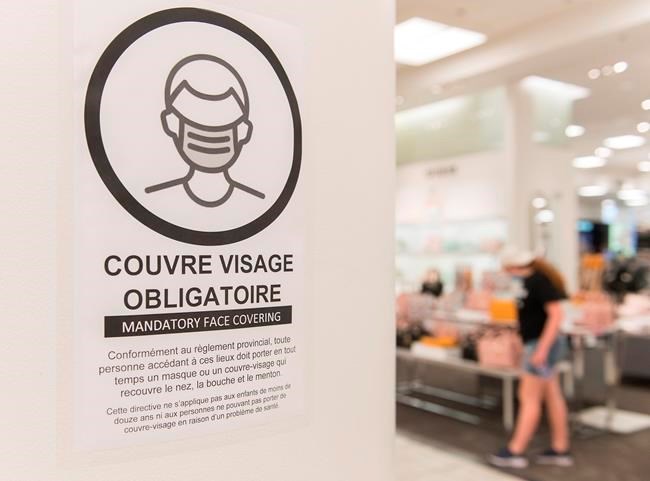MONTREAL — Quebec's move to make mask-wearing obligatory in all indoor public places as of Saturday was met with a protest march and with small business owners calling on the government to shift enforcement off their shoulders.
The new COVID-19-related directive, the first provincewide order of the sort in Canada, applies to people aged 12 and older and coincided with tens of thousands of Quebecers spanning out across the province on vacation for the traditional two-week construction holiday.
As it came into effect, associations representing the businesses that are expected to enforce the rules called on the Quebec government in a joint statement to shift the onus to those delinquent clients unwilling to wear a mask.
Public health is a collective responsibility, they wrote, and the absence of deterrents to consumers puts the entire risk and stress on businesses. The groups called on measures similar to those in Toronto or countries like England and Belgium, where fines directly target individuals.
"We do think that asking people to wear masks in indoor, closed public spaces is fine. We prefer that rather than having to go into a second confinement and having to close our businesses again," said Gopinath Jeyabalaratnam, a senior policy analyst at the Canadian Federation of Independent Business.
"Where we are having some trouble is that we have to play police, we have to be the enforcer of this measure."
Businesses will be expected to enforce the new rules and are subject to fines of between $400 and $6,000 if their customers are caught violating the directive.
Jeyabalaratnam said some businesses have opted simply to give disposable masks to clients who don't have one — an added cost. But short of putting up signs or asking citizens to put one on, there isn't much else they can do.
"It's very difficult for a store owner to enforce it in some other way, so we don't see why business owners should pay fines," Jeyabalaratnam said.
"It should be up to the person who is refusing to wear masks who is responsible in some way to pay for his or her own mistake."
In Ontario, the province has decided not to issue a provincewide order, but has left it up to municipalities to enact their own local bylaws like Ottawa and Toronto.
In Toronto, where mandatory masking has been in place for almost two weeks, many people outdoors are donning some sort of facial covering as it's the only way to get into most businesses or to hop on the city's transit system.
In Quebec, anyone riding public transit will be required to wear a mask after a two-week grace period is up on July 27.
But those opposed to mandatory masking took to the streets against the new edict, arguing the government shouldn't have a blanket policy when most regions outside Montreal weren't deeply affected by COVID-19.
Dr. Horacio Arruda, Quebec's director of public health, has repeatedly warned Quebecers to get in the habit of wearing masks to prepare for a possible second wave of the virus in the fall.
In St-Georges, in the Beauce region south of Quebec City, several hundred people took part in a march organized by business owners to voice their opposition to the order.
"We have a lot of small businesses here and people are completely against the obligation of wearing a mask, and we're worried for them because we don't want them to see their business hurt," said Chantal Giguere, one of the organizers.
She said many residents in the rural region are vehemently opposed to wearing a mask.
"It shouldn't be an obligation but a personal choice," she said. "Distancing is one thing, but the mask is something that should be optional for those who don't want to wear it."
At an east-end Montreal shopping centre, customers were taking the new rules in stride.
"I have no problem with it, I've been wearing it for more than two weeks whenever I was going indoors, voluntarily, out of respect for others," said Simon Landry. "I imagine it'll have a bigger impact if everyone wears one instead of just a few and everything we can do to avoid a second wave, we should."
Fernando Fregoso said he hadn't worn one regularly other than to do groceries, and while it can be a bit annoying wearing one, he's resigned to it.
"It's not the greatest thing, but it's the reality, I know, we have to wear it to protect everybody else," Fregoso said.
Quebec has seen a slight resurgence in COVID-19 cases in recent days, which Premier Francois Legault has said is due, in part, to house parties.
On Saturday, the province added 158 new cases, bringing the total provincial tally to 57,300.
The province also added seven further deaths for a total of 5,654.
Provincial health authorities say that 50,027 people have recovered.
This report by The Canadian Press was first published July 18, 2020.
— with files from Ugo Giguere in Montreal and Jake Kivanc in Toronto.
Sidhartha Banerjee, The Canadian Press



